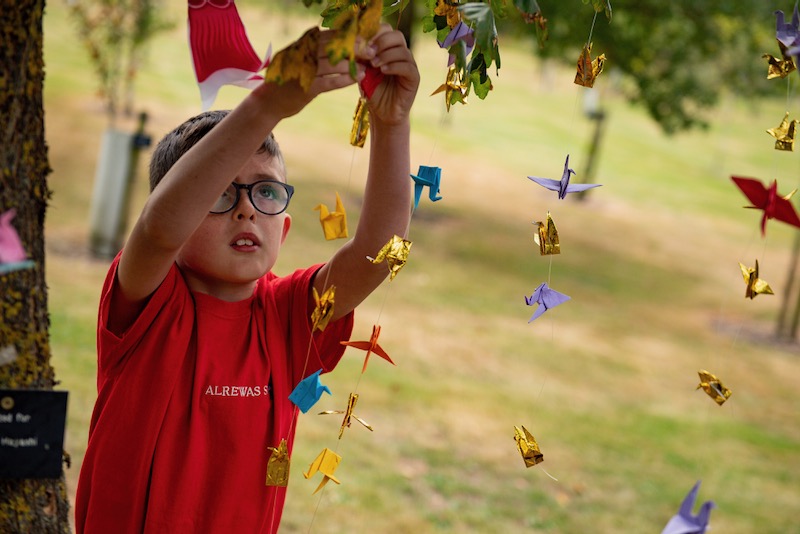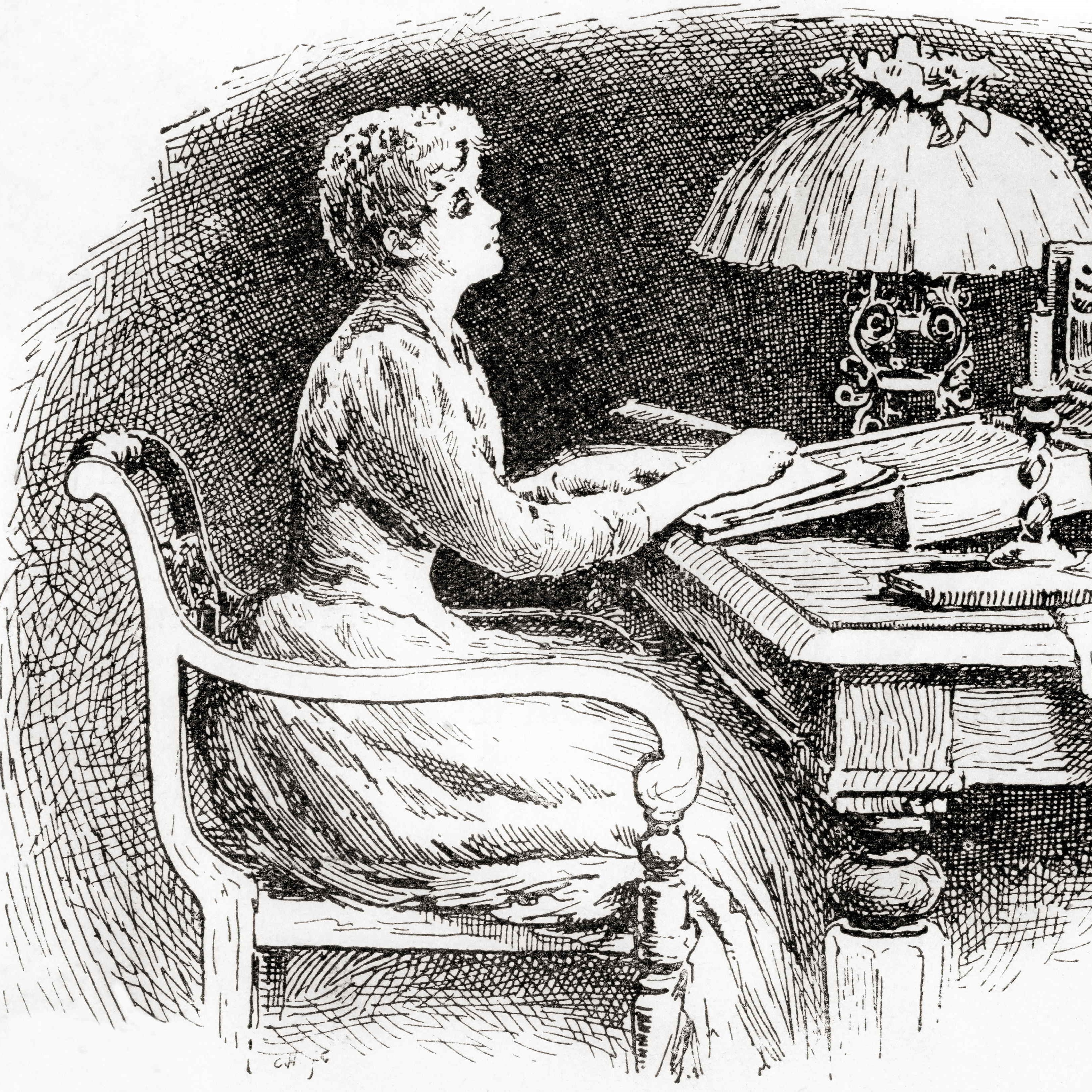People enjoy giving advice, but it’s not always the people you would choose to take advice from. Families are reservoirs of advice, and probably the easiest place to handle it, because you can choose to ignore it (even if it might be good advice in itself, and it might be embarrassing later not to have taken it). Welcome advice is not always good, and bad advice might not be unwelcome; it’s complicated.
In many Victorian novels, especially those written by women, there’s almost a special sub-genre of dying maternal advice, usually in the form of a letter, where the materfamilias commits her thoughts to paper before going into labour (and therefore probably dying) with the new baby. Writing this letter to your existing children is seen as one of a mother’s sacred duties. It’s a terrible blow, in Charlotte Yonge’s The Daisy Chain, that the mother is killed suddenly in a carriage accident, but she had her latest baby six weeks earlier, and so does not leave a letter specifically for her children (presumably, if you survive childbirth, you destroy The Letter and write another one the next time). They have to glean the last pearls of maternal wisdom and advice from her last letter to their aunt; - left unfinished, pored over by the children and recalled at various crucial stages in the rest of the narrative. Sometimes The Letter can even be a book in itself (there are some dire Edwardian ones), sometimes simply a chapter in a longer novel (telling partly how the orphaned children either virtuously put the advice into practice or sadly didn’t, and what happened after).
I’m always surprised to see this in modern books, but it still occurs, although the plot may well need to be twisted to make the basic premise believable, now that maternity death rates are better than in Victorian times. Diana Gabaldon, for example, has her heroine write a long letter of life-advice to her daughter before she leaves her to travel in time with no certainty of return. This is a rather weak justification, I feel, especially as her concerns include her daughter’s gaining weight, which a Victorian mother would have regarded as irrelevant or (worse) flippant. Sometimes people don’t even bother to justify the enterprise, but simply launch into advice, like Lord Chesterfield’s letters to his son.
Nowadays, instead of valuing maternal advice, there’s more of a trend to assume that all mothers have undergone softening of the brain and themselves need huge amounts of advice on how to handle their children. I blame the medicalisation of childbirth, because a lot of these early advisors were men (Dr Spock, Truby King), though women soon joined them, and baby and childcare experts now are two a penny. I can proudly say we never bought a book on childcare (though I might have weakened if we had been near an English bookshop). I appealed to my mother for advice before we left the country with our newborn, and she reassuringly told me that I was the expert in my baby, and to have confidence in my instincts. So Rachel and I learned on the job. When visiting, her other grandmother used to have long conversations with her about how hard she was having to work to train her parents, and she later used the same argument to encourage the younger ones to be grateful to their big sister. Not sure whether any of this stuck.
Shortly before Rachel left school, there was a short-term bestseller (originally a spoof essay, then a gift book, a recording and a chart hit) called "Wear sunscreen", which consisted simply of generic advice for younger people, most of it unexceptionable, and including "Sing", which is always good advice, though not allowed currently. If you are young, everyone older wants to tell you the things they wish they had known when they were your age, but because you’re young, you don’t think they know anything about anything. They tell you not to do the things they regret doing; so when you’re older, you have to regret not just doing them, but also not listening to the good advice you were given. Younger people do get to give advice, but it’s more likely to be accepted inside the family than out of it; and never try to teach your grandmother. Except about new technology.
Good advice is one of the things you feel obliged to attempt as a parent, even if you aren’t a Victorian pregnant mother, because you are always trying to protect your children from real-life consequences, and your power to do so is seriously limited from the moment they are mobile. Most children are good at ignoring advice, but some, including most of mine, let their parents down more gently than others. When they are in need or in danger, the urge to advise (because you can’t do anything else to help) becomes irresistible. When there is a sort of general danger, like the current pandemic, everyone seems to have advice to offer or to compare. You can see people doing it everywhere if you are out doing socially-distanced shopping : usually two older men, standing in the middle of a supermarket aisle or on a narrow pavement, talking about how people should behave, while standing rather too close together, and still making it difficult to get past.
It’s much easier to give good advice if you keep it very specific. I gave out good advice on food shopping as the children went off to university, but I tried to limit it to only a few things to improve its chances of being remembered, let alone complied with. Now they all parrot it back to me and remind each other of it, but because it’s so limited (and it was genuinely good advice anyway), it has survived in good shape: don’t buy cheap mince or rice; only buy pasta made in Italy; mild or low-fat cheese is never any good, buy better and eat less of it; only free-range eggs; and check the meat content on sausages. Small life lessons, but useful.
Getting advice because you ask for it changes the balance, and you are more likely to take it, especially during lockdown, because the adviser might be watching. The flipside of this is also true: if you haven’t been asked for advice, think a few times before proffering it, especially if the recipient is having to live with you. Everyone is an expert on something, even the youngest (Margaret says bitterly), so it makes sense to ask for advice in other people’s areas of expertise. It’s interesting watching this play out with Margaret’s job search. Different siblings are the go-to for specific questions, but more general queries get discussed at mealtimes, so that everyone can chip in.
Apart from being specific, what makes advice good? Being clear and not too long is a help. General life lessons tend to be too vague and fortune cookie. Many people still have a print of Desiderata on their wall (Go placidly…). I remember when it came with that misleading attribution, Found in Old St Paul’s Church, Baltimore, dated 1692, attached to it, but you didn’t need to be much of a student of literature to spot that as bogus from the start. The vocabulary and turns of phrase were simply too modern. Good advice, however worded, does not go out of date, but the framing may need occasional updating. However, you do need to be careful about timing when you offer it. That’s why so many people quote Polonius’ advice in Hamlet approvingly (To thine own self be true…), but in the play, he comes across as prosy and unhelpful. Nothing wrong with the advice, just the timing. Aphorisms and proverbs are not good advice, but they might be part of the mental furniture that leads to it. Slogans are never good advice, because they tend to be too simplistic.
After someone has died, their advice can be either safely forgotten, or fondly remembered, but of course if you didn’t pay any heed to it while they were alive, you probably won’t afterwards, even if you remember it. It is disconcerting, though, to hear yourself repeating something which you remember as your own parent’s advice, to your children, especially when the voice and intonation sound the same (or when you swore as a younger person you would never say that….it happens to us all).
At least advice is meant to be helpful and can come in useful. Having a Velcro memory for trivia, I am also saddled with a collection of completely useless catchphrases which my mother passed on, most from radio programmes long out of date before I was born (this is a family best-guess, with almost no evidence). This sort of saying can be as baffling as the oddities thrown up in an archaeological dig, where some Iron Age humorist has dropped a seashell into a landlocked stratum of silt. Be a man, Mary Bagnall?
My father rarely gave advice; in fact, I think I can remember only two pieces, but they were both excellent. The first was about budgeting as a student (work out arithmetically how much you have to spend each week, get less than that out of the bank in cash and never spend more than you have in your wallet). The second was towards the end of his life, when he said to me: “Whatever you do, stay out of the hands of doctors.” He was a GP for more than forty years, and a very good and most beloved one. He was fond of his colleagues, but he didn’t like being a patient.
After my (very wise) mother-in-law’s death, the family put together a collection of her familiar sayings, some of them advice, some of them jokes, and printed them all on a tea towel. This was an excellent idea, although I’m regularly undecided about whether to use it so that the sayings remain current, or keep it in a drawer so that they don’t fade in the wash. Ideally, we need two. Good advice may not always be welcome, but it’s worth having.
Kate Keefe composes musical settings for the Mass and writes about the psalms. You can follow her on Facebook, Twitter and LinkedIn



 Loading ...
Loading ...
What do you think?
You can post as a subscriber user ...
User comments (0)